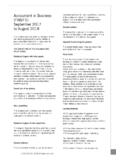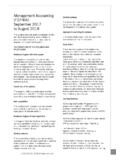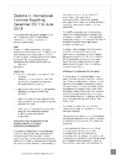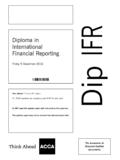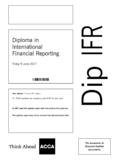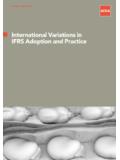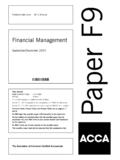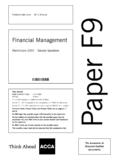Transcription of A guide to directors ... - Home | ACCA Global
1 A guide to directors responsibilities under the Companies Act 2006 PAGE 3A guide to directors responsibilities under the Companies Act 2006 John Davies Head of Business Law, ACCAC ertified accountants Educational Trust, July 2007 PAGE 4 About ACCAACCA (the association of chartered certified accountants ) is the largest and fastest-growing Global professional accountancy body with 296,000 students and 115,000 members in 170 countries. We aim to offer first-choice qualifications to people of application, ability and ambition around the world who seek a rewarding career in accountancy, finance and deliver our qualifications in partnership with many organisations. We operate 18 joint examination schemes with national bodies around the world and work closely with 470 registered tuition providers and nearly 8,500 employers of accountants and finance professionals.
2 We aim to support our students and members throughout their careers, delivering services through a network of nearly 80 offices and use our expertise and experience to work with governments, donor agencies and professional bodies to develop the accounting profession. We aim to achieve and promote the highest professional, ethical and governance standards and advance the public s reputation is grounded in over 100 years of providing accounting and financial qualifications. Our long traditions are complemented by modern thinking, backed by a young, dynamic responsibility for loss occasioned to any person acting or refraining from acting as a result of any material in this publication can be accepted by acca . The association of chartered certified accountants , 2007 PAGE 5 ContentsAbbreviations used in the text 61.
3 Introduction 72. What is a director ? 103. Eligibility to act as a director 164. Appointment and vacation of office 185. Powers of directors 256. directors general duties under the Companies Act 2006 287. directors responsibilities concerning accounting and reporting 478. directors other statutory responsibilities 619. directors transactions with their company 7110. Consequences of breaches of directors responsibilities 8211. Ratification of breaches and relief from liability 10012. Special cases 102 Appendix 1 107 Appendix 2 130 PAGE 6 CA 2006 or the Act Companies Act 2006 CDDA 86 Company directors Disqualification Act 1986 CLR Company Law Review Steering Group IA 86 Insolvency Act 1986 the Code the Combined Code on Corporate GovernanceAbbreviations used in the textPAGE The enactment of the Companies Act 2006 in November of that year was the culmination of a nine-year project which amounted to the biggest official review of UK company law for over 40 years.
4 The project comprised a three-year in-depth investigation by a Government-appointed expert group the Company Law Review Steering Group (CLR) detailed research on specific issues by the Law Commissions of England and Wales and Scotland, and extensive public consultations on a wide range of technical matters by the Government itself. The new Act which has emerged from this exercise consolidates the great bulk of the pre-existing companies legislation, in the process creating the biggest single statute in UK legal history: the Act contains 1,300 sections and 16 schedules, with much more material to be issued separately in the form of regulations to be made under the Act. The aim behind the reform process was not, however, just to consolidate the fragmented state of UK companies legislation but to modernise it where appropriate and thus make it more relevant to the business conditions of the 21st century.
5 In keeping with this aim, the Act makes changes in the following areas (among others): It streamlines the legal rules for the administration of private companies so as to recognise the fact that, in most such companies, ownership and management is in the hands of the same individuals. Private companies, which form the vast majority of the companies on the register at Companies House, will no longer need to appoint a company secretary, hold an Annual General Meeting or lay accounts before their members in general meeting. The Act also makes it easier for such companies to pass resolutions in writing. It brings company law up to date by giving new recognition to electronic forms of communication for the purposes of conveying statutory information. Public companies are required to have web sites and to post specified corporate information on them.
6 New measures are introduced to try to improve the accuracy and integrity of company information on the public record at Companies House. The Act also gives the Registrar of Companies the power to insist that any statutory document, including companies annual accounts, be filed electronically. Company auditors will be able to negotiate liability limitation agreements with their clients. Shareholders have new powers to intervene in the governance of their companies. A significant constitutional reform made by the Act is that the separate company law status of Northern Ireland is ended, meaning that the new Act and all the regulations to be made under it will apply for the first time to the whole of the UK. 1. Introduction PAGE Two fundamental issues were considered during the review process in the context of the need to modernise UK company law.
7 First, should the law expect from limited companies any wider social responsibilities or should they simply be left alone to make profits? Secondly, should any new legislation be more specific about what the responsibilities of company directors should be? The outcome of the lengthy consideration of these two related issues is that not only have the legal responsibilities of directors been for the first time codified in other words set out in statute, rather than left to be addressed by common law principles but they have been in some respects expanded with the aim of ensuring that, in running their companies, directors take into account a range of wider environmental factors that are considered to characterise responsible corporate behaviour in the 21st century. As well as this important reform to the structure of the decision-making process, the Act recognises the trend of the courts in recent years by expecting higher standards of skill and care from company directors .
8 Between them the changes made in these two areas now form the basis for how directors are expected to operate and account for their actions to their companies and the outside world. The greatest potential impact of these new statutory responsibilities for directors will be felt in large and listed companies which have complex business activities and large numbers of shareholders and other stakeholders. In fact, however, the changes apply to all companies, large and small, so it is essential that all directors familiarise themselves with what is expected of them under the Act. The new Act is carefully worded to make clear that, as has always been the case, directors owe their legal responsibilities to the company alone, and not to outside parties (except in certain exceptional cases). Thus, there is no question that in carrying out their functions directors will be accountable routinely to individual shareholders or to third parties.
9 But the rules on directors accountability to their own members are reinforced shareholders are given new legal rights to initiate company proceedings against directors for breach of their responsibilities. Thus, the revised rules on directors duties are backed up by strengthened provisions for the enforcement of those duties. The Act makes a number of other, technical reforms to the rules on eligibility to act as a company director and to the information that individual directors must provide to their company and place on the public record. In addition, directors need to be aware of the changes which are made to the legal rules on the administration of company affairs, since they will be responsible for ensuring compliance with these rules. This guide looks at what the Companies Act 2006 means for company directors , with special emphasis on the reforms to the rules on directors duties.
10 It is not a comprehensive guide to the Act but to those aspects of the Act which impact squarely on directors . Much of the content may be familiar in that it refers to legal requirements which have been carried over from the Companies Act 1985 and other legislation (though the statutory references have changed), but the new measures introduced by the Act are looked at separately. Where appropriate, relevant company law principles laid down by the courts are referred to in the text. The guide also contains a comprehensive table, at Appendix 1, of the statutory duties for breach of which directors may be criminally liable under the Act, together with a summary of relevant offences under other legislation. Introduction (continued)PAGE Two additional points need to be made at the outset. First, although the Act became law in November 2006, it was decided to bring it into effect in stages between then and October 2008, with existing provisions of the Companies Act 1985 remaining in force until such time as they are formally repealed or replaced by provisions of the new Act.
